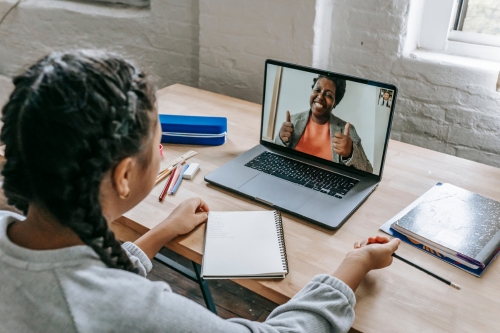Questions Every Parent Should Ask Before Hiring A Tutor

If you want your child to enjoy the benefits of private tuition, you’ll be eager to have someone in place instructing them as soon as possible. But, at the same time, any tutor has to be the right ‘fit’ for the student they’re teaching.
So, understandably, you’ll want to talk to your child’s tutor and learn a little more about what they offer before sessions start. And although most agencies vet their staff thoroughly, you’ll no doubt also have some questions of your own.
Here’s our list of what to ask candidates before they start tutoring your son or daughter:
- What are your credentials? This includes teaching experience and qualifications, as well as up-to-date, valid DBS checks and references from previous parents.
- What are your preferred teaching methods? This will help establish whether their teaching style suits the way your child learns best. Remember, your child will probably be tutored after school, when they’re already tired. How will the tutor maintain momentum? Do they have any secondary specialisms, such as exam technique? How will they get a sense of what your child needs? What experience do they have specifically with the area your child is struggling with?
- Which exam syllabuses are you familiar with? This will help prepare your child for the test they’ll take at the end of the programme of study. (You can also check the syllabus online yourself.)
- How will progress be assessed? As with anything else, you’ll want to see some tangible results from your child’s tutoring. So the tutor should have a system in place for this, such as note-taking or marks achieved on past papers, and be happy to share it with you.
- How can I help the process as a parent? You may need to supply some materials, for example, or download some online resources – alternatively, the tutor may provide everything. Ask whether there is anything else you can do to help your child, and the tutor, to secure the best possible results.
- Is it OK to contact the tutor between sessions? Many tutors have no objection to contact between lesson. But all are working teachers, and are likely to be busy. So it’s a good idea to establish in advance the tutor’s availability and how and when you can get in touch if you need to. This clarifies things from the outset and helps build a fruitful working relationship. If no contact is possible between sessions, how will the tutor communicate with you – and how often?
- Ask about the sessions themselves: Obviously, you’ll want to establish how long each session will last, the day of the week and the time they’ll happen, and the location if classes are being held in person. If you think an hour may be too long for your child, for whatever reason, discuss this too, and agree on, say, 40 or 45 minutes.
- How will you ensure my son or daughter enjoys the classes? Remember that tutoring comes on top of the regular school day. So how will the lesson be structured to maximise productivity and focus? If your child has a particular need, from hearing loss to ADHD, make sure the candidate knows about this too, and has previous experience of working in similar situations.
- Other nuts and bolts: There are a few more practical things parents should check out, including pricing, cancellation policy and whether the tutor offers an initial free trial to assess suitability before you make a longer-term commitment. Are there any additional charges on top of the regular fees?
- What results can I expect to see? And by when? And what can we do if my child isn’t seeing the benefits we expected?
StudyBox offers both online and in-person private tuition at four centres across south London. Subjects include maths, English, science and computer coding, plus we prepare students for SATS, 11+ and GCSE exams.
Browse our website, book an initial free trial and look forward to seeing your child thrive at school. We’ll gladly answer any questions you may have.
Online VS. In-Person Tutoring: Which Is Best For Your Child?

Private tuition offers a number of benefits, including programmes of individual instruction and personalised learning plans, which enhance confidence and motivation. Students develop study skills as they work, and build a strong relationship with a trusted mentor. Together with the flexible learning and one-to-one attention, this boosts academic performance.
So tutors fill in the gaps in a student’s learning, and can also help where someone is struggling in a particular topic area.
But one decision parents will have to make is whether to hire an online or in-person tutor. In truth, there pros and cons to each option, with each offering a decent number of benefits, depending on individual circumstances. After all, both types of tutoring involve one-to-one support with tailored lesson plans to help a child realise their full potential. And both online and classroom tutoring can be highly effective.
Here, we look at each one in more detail:
Online private tuition
- Flexibility
Most families have busy schedules that must take into account the needs of every member of the household. Online tutoring is highly flexible in that it fits around family life. You don’t have to physically take your child anywhere for the sessions, plus you can organise them for days and times to suit you, your child and any other activities they may be doing. Equally, you won’t be held up in traffic or by public transport delays.
What’s more, as long as there’s a strong Wi-Fi connection, sessions can continue if, for example, your son or daughter is on holiday, a school trip or visiting grandparents. They don’t have to skip classes.
- Home comforts
With web-based teaching, your child learns where they probably feel at their most relaxed and comfortable – their own home. There’s easy access to all their favourite snacks and drinks and they can be ready to start the session on time, instead of spending time taking out books and hanging up coats etc.
- Draw from a wider talent pool
If your child hasn’t previously clicked with a local in-person tutor, try going online. You draw from a much wider pool of potential instructors, especially, for example, in rural areas.
- Safety
Private tutors are, of course, vetted and have DBS checks, however they teach. But if you do have any lingering safety worries, online tuition may give you extra peace of mind. Additionally, lessons can be recorded and reviewed in the unlikely event that you have any concerns about safety or the quality of the teaching, providing extra reassurance.
In-person sessions
Some families may prefer to book in-person private tutoring. Here’s why:
- Social interaction
Whatever their age, your child will be developing their social skills. And interacting in-person with a tutor can help with this, as can meeting fellow tutees, even in small groups.
- Some learners prefer in-person learning
Some kids are tactile or hands-on students, also known as kinaesthetic learners. That means they perform best through physical action and movements and by interacting with their environment. In other words, it’s a preference for ‘feeling’ and active ‘doing’, rather than passive reading or listening.
This group, and younger children in some subjects, may prefer to be in the same room as their instructor.
- No technological issues
If there are any issues with Wi-Fi speed or other technological hiccups, this can have a significant impact on the productivity of the session. (Although, happily, it doesn’t happen that often!)
- A more direct experience
In person, the experience may feel more direct and personalised, in that tutors can notice a student’s body language and non-verbal clues. So they may identify any learning gaps more rapidly. At the same time, tutor and tutee may find it easier to build a fruitful working relationship.
When making your decision, bear in mind that every family is different and so there’s no right or wrong. Think about whether you need to prioritise convenience, your budget (online tutoring is often cheaper), your child’s learning style and where they would feel most comfortable, the speed of your web connection and how easy it is to find a tutor in your area.
The best of both worlds with StudyBox
At StudyBox, we offer both online and on-site private tuition in groups of no more than four at one of our centres in West Malling, Sutton, Wallington or Croydon. This allows each family to choose what works best for them. Talk to us if your child needs help with Science, English or Maths or is sitting SATS, 11+ or GCSE exams. We even run kids’ coding sessions.
Browse our website – and book your free trial today.
How A Tutor Can Keep Your Child on Track During School Breaks

You’re no doubt already aware of the many benefits of hiring a private tutor for your child, including the improved confidence, one-to-one attention and tailored study offered, not to mention the boosted academic performance.
But you may not have realised how taking on an education professional like this can also help your son or daughter keep up their studies during school holidays, so that they’ve not fallen behind by the time they’re back in the classroom, but instead return with a head start.
After all, the phenomenon of ‘summer slide’, in which children lose significant maths and literacy understanding over the six-week break is well documented. (Indeed it’s been studied since early last century.) And some teachers have reported it can take pupils between three and six weeks to catch up at the start of a new academic year. Every subject can be affected, and it’s something that may cause a dip in confidence.
Here’s how a tutor can help during the school holidays:
- Keeping up the momentum
Tutoring support will mean your child maintains momentum through consistent practice and review, keeping them on schedule. Part of this may involve working on any assignments or homework which they’ve been set for the holidays.
- Consolidation and filling in gaps
If there are any specific areas of learning which your child has found especially challenging, a tutor’s targeted instruction can help fill the gaps in their knowledge or understanding. The holidays can also be a great time for consolidation, and for reviewing material which has previously been covered.
- A tailor-made approach
Private tutors offer a bespoke service, and this applies just as much during school breaks as it does in term-time. The teaching style will be adapted to suit the way your child works best, and their learning pace. This keeps them engaged and ensures they make progress.
- ‘Soft’ skills
As well as the academic learning itself, tutors can use their personalised support to develop ‘soft’ skills which your child may not have had time to work on in school. These include confidence in their own abilities, plus effective study habits including time management and exam techniques. Once mastered, these skills stay with a learner throughout their academic career.
- Making learning something your child enjoys
Just by learning with a different person in a different way, studying becomes more enjoyable and engaging, even fun. A tutor’s supportive, positive assistance can foster a life-long love of learning in your child.
Private tuition in the school holidays from StudyBox
StudyBox offers English, maths and science tuition and runs coding camps during breaks such as half-terms and summer vacations, as well as in term-time. With physical centres in Sutton, Croydon, Wallington and West Malling, we’ve got 11+, GCSEs and SATs covered. We also provide flexible one-to-one online tuition tailored to your child’s needs during the vacations, from £30 an hour. We’ll allocate one of our London-based tutors, all of whom are highly experienced in their fields. What’s more, we’ve been offering our services for a decade.
Sign up for your free trial now – we’ll take it from there.
The Impact of Tutoring on Motivation & Engagement in School

There can be many reasons why a child is unmotivated or unengaged in school. They may feel their classroom setting is unsupportive, or they may not get on with a particular teacher. The timetable may feel too busy or rushed, or sometimes anxiety, social challenges or a condition such as ADHD make it hard for them to focus and concentrate. However, even those without a diagnosable issue may still have difficulty realising their full potential in a traditional school environment.
For families who hire a private tutor for their child or children, the impact on their kids’ motivation and the way they engage with learning in school can be profound. And, it’s not just about academic performance, important though that is – it’s also about wellbeing and things like confidence.
So tutoring shouldn’t be seen as a standalone, but as something which actively complements classroom teaching rather than replacing it. Here are some of the benefits you can look forward to as a parent or guardian:
- Small groups: With individual or small-group tuition, kids often feel more able to ask questions freely without worrying about potential embarrassment or feeling rushed. This can clarify any doubts they may have about a topic or specific point, in turn boosting confidence, engagement and motivation.
- Mastering study skills: Tutors don’t just focus on academic content but can also pass on effective study skills, so that students understand how to manage their notes and other materials, how to revise and how to organise their time. And once they understand better how to study, they can apply this at school and feel more motivated generally. Other skills they might well learn include critical thinking and problem solving, as well as resilience.
- A new enthusiasm for learning: Tutoring in itself can simply reignite a student’s motivation to learn. Once they start to notice that they’re getting better marks and that they can overcome any academic hurdles, they become more engaged, in turn putting more effort into their academic work. Some of that can often be down to simply having a troublesome topic explained in a different way by a different instructor.
- Increased positivity: The supportive environment of tutoring sessions can reduce stress, and create a setting in which learners feel happy to address any concerns and ask for help, even potentially improving things like sleep. Self-esteem and confidence should also, as mentioned, go up. Tutors can also look out for and spot any signs of stress, anxiety or similar issues, not least because they are with the children less than their classroom counterparts, and in a more concentrated way, so any problems are likely to become more obvious. And we all feel more engaged when we’re happier and more confident. What’s more, a private tutor provides an objective, listening ear outside of school and the home, so your child may feel more comfortable talking to them about any school or personal matters.
How we can help
At StudyBox, we’ve seen many children become engaged, motivated students with a little help from us. We offer tutoring in maths, science and English, as well as kids’ coding, either online or at one of our teaching centres in Croydon, Sutton, Wallington or West Malling. We follow the UKs National Curriculum for SATs, 11+ and GCSE exams, and use a number of different teaching techniques and materials, both digital and paper-based.
Book your free trial today. We’ll thoroughly assess your child and where they are academically, before coming up with a personalised lesson plan that will see their motivation levels and engagement in school soar.
